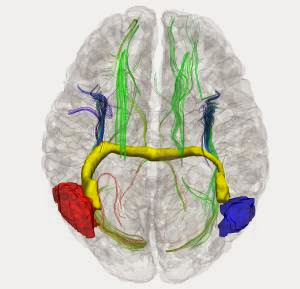Seminar Papers

In this news, the formation/removal of the memory is addressed with the connection strength. Before being revealed this relationship, the strength of connection between neurons in brain couldn’t be explained with the process of the memory. However, the Malinow team have proved relationship between strength of connection and memory by detecting the long term potetiation(LTP) and long term depression(LTD). According to the news paper, it is said that the LTP is detected when the memory is formed and LTD is also identified when removing the memory. This news would be helpful to understand the way of forming, removing and retrieving the memory.
If you are interested in this news, please click the figure or following link :-)
Read more: http://www.sciencedaily.com/releases/2014/06/140601150812.htm
This article summarizes that what is stress and how the stress and brain is related. Stress can be divided into two parts. One is short-term stress and chronic stress. The short-term stress can be benefit for people but chronic stress can make the brain structure such as hippocampus or prefrontal cortex be shrink. These two brain regions function 1) the integration in learning and the memory(hippocampus) and 2) high-level thinking(prefrontal cortex). This article helps you understand stress and the effect of stress on brain briefly.
If you are interested in this article, please click the following link or figure.
Read more: http://www.theprovince.com/news/Stress+strain+brain+health+peril/9892829/story.html
Music is one of the language that works on our emotion. The functional magnetic resonance imaging (fMRI) study have revealed that the music elicit out brain to activate as like we dialogize when two musician plays to the instruments.
Additionally, it is identified that the different types of music make our brain activate differently. See how tango has own map.
Read more: http://www.policymic.com/articles/89655/here-s-a-surprising-look-at-what-music-does-to-your-brain
Conceptual art is that the idea or concept is regarded as the important aspect of the work. One of the conceptual artist Lena Park manipulated the vibration of the water by using the brain waves in real-time. She uses five metal dishes as the speakers and these speakers are correlated with specific emotions: sadness, anger, hatred, desire, and happiness. To perform this, she used EEG headset (wireless EEG).
Read more: http://neurogadget.com/2013/12/04/artist-uses-brainwaves-to-manipulate-the-motions-of-water/9104
Chlidren born without corpus callosum can develop new connection to link two brains. This new connection is expected to be created during the mother’s womb and this new pathway don’t exist in normal people.
The high visit-to-visit variability blood pressure is linked with declined cognitive function.
This result is investigated by experiment aimed at elderly aged 70 to 82.
Read more: http://psychcentral.com/news/2014/04/22/brain-risk-from-fluctuating-blood-pressure/68832.html
Researches have found that psilocybin (the active chemical in psychedelic mushrooms) inhibits fear-related neural activity and weakens the processing of the anxiety inducing stimuli.
Read more: http://bit.ly/1kMGPC8
Original paper: http://bit.ly/1inKhF2

Self-expanding activities are helpful to those who want to quit smoking.
Smokers who engaged in a series of two-player cooperative game with their relationship appears to reduce craving for nicotine.
Brain regions which plays role for major reward are more activated in smoking group who performs the ‘self-expanding’ activities than non-expanding conditions.
Read more: http://www.newswise.com/articles/want-to-quit-smoking-new-study-says-try-self-expanding-activities
The one year has been passed since Obama, President of US, announced the Brain Initiative.
Connectome of mouse and fatal brain has been revealed in a one year. In this news, how the brain mapping is developed in one year and why the brain mapping is on the way of milestones.
Read more: http://www.nytimes.com/2014/04/22/science/brain-mapping-milestones.html?_r=0
Yoga is one of the way to make our mental calm or relieve. This yoga came out that it can change the brain volumes.
The somatosensory cortex, superior parietal cortex is enlarged in the brain of yogis. Moreover, the hippocampus which has the role of diminishing the stress also have the large volume.
If you are interested in this article, please click the figure or following link
Link: http://www.scientificamerican.com/article/how-yoga-changes-the-brain/http://www.scientificamerican.com/article/how-yoga-changes-the-brain/






